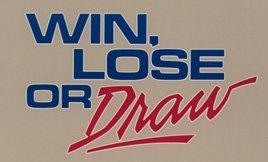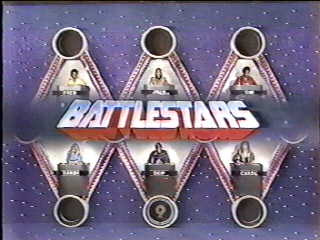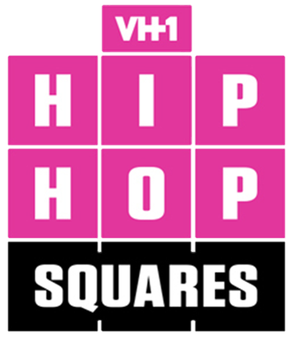Game play
Each game featured two contestants, each partnered with a celebrity guest. The celebrities each stayed on for the entire program while contestants played only one game, win or lose.
Each round centered around a board which contained the face of a celebrity, cut into seven horizontal strips and jumbled vertically. At the beginning of each round, only one strip was revealed. Then, alternating between the celebrities and the contestants, the pairs were asked trivia questions in the form of an incomplete sentence (for example, "The last king of France was...").
After each question, more of the face was revealed (still in jumbled order). The first two questions revealed one part each, while the next two revealed two parts each. The player who correctly answered the question had the opportunity to guess the identity of the celebrity after the new parts were revealed. An incorrect answer gave the opponent the right to guess.
If the identity was not guessed after all seven parts were revealed, play continued with each question offering a chance to swap the positions of two parts. Incorrect answers moved on to the next question and did not give the opponent control. The player who answered correctly chose one part of the face and their partner chose another part; the two were then swapped. The first partner could then guess the answer.
The team which correctly identified the celebrity won $150 for the contestant.
"Three of a Kind" Bonus Game
In the bonus game, one partner was asked to find the eyes of a given celebrity, and three strips containing of eyes were shown very briefly, one at a time. If the player could choose the correct eyes, they added $50 to the contestant's winnings.
This was repeated for three mouths and noses, with the partners alternating. The second correct answer added another $50, and the third correct answer earned another $250 for a total of $500.

Pyramid is an American game show franchise that has aired several versions domestically and internationally. The show was developed by Bob Stewart. The original series, The $10,000 Pyramid, debuted on March 26, 1973, and spawned seven subsequent Pyramid series. Most later series featured a full title format matching the original series, with the title reflecting an increasing top prize. The game features two contestants, each paired with a celebrity. In the game, the contestants and celebrities attempt to identify words or phrases through clues given by their teammates. The title refers to the show's pyramid-shaped gameboard, featuring six categories arranged in a triangular fashion. The various Pyramid series have won a total of nine Daytime Emmys for Outstanding Game Show, second only to Jeopardy!, which has won 13.

Eye Guess was an American game show created by Bob Stewart and hosted by Bill Cullen, which aired on NBC from January 3, 1966, to September 26, 1969. The game combined a general knowledge quiz with a Concentration-style memory element, where the answers were shown to the players and their recall of their positions was tested.

Win, Lose or Draw is an American television game show that aired from 1987 to 1990 in syndication and on NBC. It was taped at CBS Television City, often in Studios 31, 33, and 43 at various times. It was co-produced by Burt & Bert Productions and Kline & Friends for Disney's Buena Vista Television. It has also had two versions on The Disney Channel: Teen Win, Lose or Draw from 1989 to 1992, and a revived version known as Disney's Win, Lose or Draw which aired in 2014. New York described Win, Lose or Draw as "a knockoff" of the board game Pictionary, however, Burt Reynolds and Ed McMahon referred to playing the game at Burt's home during the August 2, 1978 episode of The Tonight Show, with Johnny Carson, three years before Pictionary was created.

Chain Reaction is an American television game show created by Bob Stewart, in which players compete to form chains composed of two-word phrases.

Body Language is an American game show produced by Mark Goodson Productions. The show aired on CBS from June 4, 1984, until January 3, 1986, and was hosted by Tom Kennedy. Johnny Olson announced until his death in October 1985; Gene Wood and Bob Hilton shared the announcing duties afterward, having substituted on occasion before then.

Dream House is an American game show that saw contestants competing to win, as the title of the show indicates, a new house. The show originally premiered in primetime on ABC on March 27, 1968, with a daytime edition premiering on April 1, 1968. The primetime series aired weekly until September 19, 1968, and the daytime series aired daily until January 2, 1970, when it was replaced with All My Children. The daytime series was revived for NBC's daytime schedule and premiered on April 4, 1983, running until June 29, 1984.

Catchphrase is a British game show based on the short-lived American game show of the same name. It originally aired in the United Kingdom between 12 January 1986 and 23 April 2004. A revival premiered on ITV1 on 7 April 2013 and is still running as of 2024.

Battlestars is an American game show that aired on NBC during the 1980s. The program's concept was developed and produced by Merrill Heatter, featuring a six-celebrity panel. The object of the game is to "capture" the celebrities by lighting up numbers positioned around triangle shapes, inside of which sat each panelist. Similar to Hollywood Squares, which Heatter also co-created and produced, the celebrities are asked questions by the host, and the contestants judge the truth of their answers in order to light up the numbers.

Blackout is an American game show that was broadcast on CBS as part of its daytime schedule from January 4, 1988 until April 1, 1988. The program was created and produced by Jay Wolpert. The game features two contestants, each paired with a celebrity. Contestants attempt to solve word puzzles consisting of a sentence or short paragraph with four blank spaces. Players guess each missing word based on hearing clues recorded by their partner, but with the playback being muted or "blacked out" at certain places by their opponent.

Mindreaders is an American game show produced by Goodson-Todman Productions which aired on NBC from August 13, 1979, through January 11, 1980. Although NBC originally agreed to a 26-week run, the network canceled Mindreaders after 22 weeks. The host was Dick Martin and the announcer was Johnny Olson, with Jack Narz subbing. The program was taped at Studio 4 at NBC in Burbank, California.
It Takes Two is a game show in which contestants gave numerical answers to questions. The original program was created and produced by Ralph Andrews and aired on NBC from March 31, 1969, to July 31, 1970, at 10:00 AM Eastern. A second version, produced by Mark Phillips Philms & Telephision, aired on The Family Channel in 1997.
The Last Word is a game show seen in syndication in the United States and on the Global Television Network in Canada that was produced by Merrill Heatter Productions and ran for 65 episodes from September 18 to December 15, 1989, with reruns continuing until January 5, 1990. The host was Wink Martindale, and the co-host/announcer was Jennifer Lyall. It was taped in Vancouver, British Columbia. In the Los Angeles-produced pilot, Burton Richardson was the announcer, and Jana White operated the computer and acted as co-host. The show was distributed by Turner Program Services.
PDQ and Baffle are American television game shows created by Heatter-Quigley Productions. Both shows' objective was for contestant/celebrity teams to guess a given word or phrase in the shortest amount of time with the fewest letters given as possible.

Showoffs is an American television game show which ran on ABC from June 30 to December 26, 1975. Bobby Van was host, with Gene Wood as announcer. The Mark Goodson-Bill Todman production involved two teams competing in a game of charades.

Missing Links is a Goodson-Todman game show hosted by Ed McMahon which originally ran on NBC from September 9, 1963 to March 27, 1964, then moved to ABC for its final nine months, with Dick Clark replacing McMahon as host.

Supermarket Sweep is a British game show that is based on the original American version. Originally hosted by Dale Winton, it ran for exactly 8 years from 6 September 1993 to 6 September 2001 and then revived from 12 February to 31 August 2007 on ITV.
Jumble is a British game show that aired on ITV from 12 March 1991 to 4 September 1992 and is hosted by Jeff Stevenson.

Three for the Money is an American game show produced by Stefan Hatos-Monty Hall Productions that aired on NBC from September 29 to November 28, 1975. Dick Enberg was the host with Jack Clark announcing. Enberg was also hosting Sports Challenge at the time and had just joined NBC's sports division.

Hip Hop Squares is an American television game show originally hosted by Peter Rosenberg, which debuted on MTV2 on May 22, 2012. The show is a licensed format of CBS Television Distribution's Hollywood Squares featuring mostly rappers. The MTV2 version of the show was taped in Brooklyn, New York. The VH1 version was taped in Hollywood, California.

Ellen's Game of Games, also known as Game of Games and stylized as ellen's GAME OF GAMES, is an American television game show that aired on NBC. In March 2017, NBC ordered six hour-long episodes of the series. Ellen DeGeneres serves as host, while Stephen "tWitch" Boss appears as announcer/sidekick. The series is based on game segments from DeGeneres' daytime talk show, The Ellen DeGeneres Show. The series premiered on December 18, 2017. On February 18, 2020, DeGeneres announced on The Ellen DeGeneres Show that the series was renewed for a fourth season, which began airing on October 6, 2020. In January 2022, the series was canceled after four seasons.
















